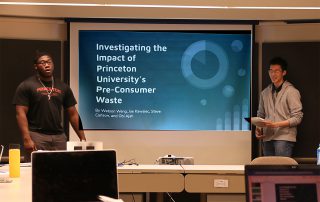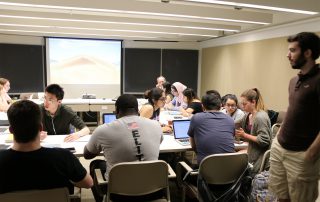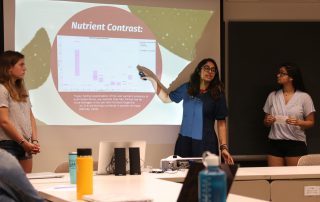Learning Goals
How can agricultural practices meet the growing demand for food while simultaneously curbing its impacts on biodiversity, energy use, water demand and greenhouse gas emissions? Providing students with the tools for answering this question is the aim of Daniel Rubenstein’s 250th-funded course, “Agriculture, Human Diets and the Environment.” Rubenstein’s students have the opportunity to use data gathered from local farms that practice traditional or organic farming methods to test hypotheses about food production, learning about the complexities and tradeoffs associated with different farming strategies. These data were collected by fellow students, who studied the actions of farmers, measured their impact on the land, their crops, and associated wildlife, and interviewed them to get a deeper understanding of how they make decisions.
250th Criteria
Few courses on campus focus on the multidimensional nature of the food system. Rubenstein’s new course fills a gap in the curriculum, drawing on the natural sciences, engineering, and the humanities to consider the evolution of human diets; the physiology, psychology, and “business” of food choices; and the pros and cons of alternative farming practices, among other topics.
Learning Opportunities
Rubenstein’s students attended lectures and precepts, but they also participated in regular culinary labs and town hall meetings. The culinary labs allowed students to taste early domesticated plants and heritage grains, to craft menus for the year 2050, and to track and reflect on what they ate. In the town hall meetings, students had the opportunity to engage in Q&A with the authors and scholars whose work they read, such as Richard Wrangham, who shared insights on the dietary revolution by cooking invented by our early hominin ancestors, and David Tilman, whose life cycle analyses challenged a number of assumptions associated with organic and other alternative types of farming. Perhaps most excitingly, Rubenstein’s students worked with quantitative and qualitative data collected from local farms to develop hypotheses about how to produce food that is nutritionally high in value in ways that minimize harm to the environment. From their analyses they drew inferences that helped them answer the overarching question of the course. The students’ final presentations not only enabled them to share their insights with one other, but also to provide important feedback to the farmers themselves.
Images
FACULTY
Daniel Rubenstein
Class of 1877 Professor of Zoology. Professor of Ecology and Evolutionary Biology. Director, Program in Environmental Studies.




